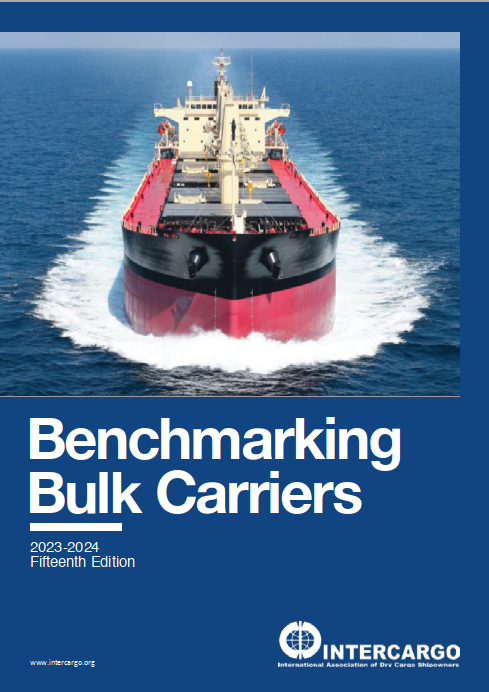The INTERCARGO “Benchmarking Bulk Carriers” 2023-2024 report has been published and it is available free of charge to INTERCARGO members.
Members may access the report below or download the attached (.pdf) file (login required).
Non-members may order the report from the Secretariat at info@intercargo.org or online here.
Prices are GBP 60.00 for the electronic version and GBP 75.00 for hardcopy.
Foreword / Executive Summary
Through 2023 and at the start of 2024 the world has seen significant upheaval, not only from the now two-year-old Ukrainian crisis and the unprovoked attacks on civilian vessels in the Red Sea off the coast of Yemen, but also the seeming resurgence of Somalian piracy throughout the Indian ocean.
INTERCARGO joined other industry bodies in expressing their deep concern over the tragic loss of life and injuries suffered by the crew of MV True Confidence in an attack in the Red Sea on 6 March 2024. The loss of life and injuries to unarmed seafarers is completely unacceptable. Merchant vessels crewed by civilian seafarers transporting global trade have a right to innocent passage through the region without the threat of attack. The frequency of attacks on merchant shipping highlights the urgent need for all stakeholders to take decisive action to safeguard the lives of innocent seafarers and put an end to such threats. Our heartfelt sympathies go out to all those affected by this terrible event.
During 2023 INTERCARGO reached historic highs in its membership and now represents one third of the global dry bulk fleet in DWT terms, an achievement we are very proud of whilst we are honoured that so many new members have seen the benefits of joining our association, which strives to address the key issues being faced in the dry bulk sector.
INTERCARGO remains committed to promoting best practices and raising the quality bar above and beyond regulations. DryBMS, as a voluntary company self-assessment scheme, is such an example and we are delighted that the Dry Bulk Centre of Excellence (DBCE) launch coincides with the issuance of the present benchmarking report.
The INTERCARGO badge of quality is widely recognised within the industry and as shown also in this 15th edition of the benchmarking report, the efforts of our members in helping us to achieve our ambitious aims and objectives is to be commended.
The present benchmarking report continues to evaluate the bulk carrier industry through numerous performance indicators, of which the highlights are as follows:
Global Fleet and Market Trends
The Baltic Dry Index (BDI) started 2023 at a very low 681 before steadily climbing until reaching a high of 2,937 in November. Since then, it has declined but still maintaining a healthy 2,000 level as in March 2024. The deadweight tonnage of the global fleet increased by about 3% in 2023 bringing the global total of bulk carriers to 13,096, equating to about 982m DWT.
Casualty reporting
Twenty-one (21) bulk carriers over 10,000 DWT have been identified as total losses over the years 2014 to 2023. The average age of bulk carriers lost was 19.4 years and in total 1.8m DWT have been lost which equates to an average 178k DWT per year. Cargo shift and liquefaction remain the greatest contributors to loss of life and groundings remain the greatest causes of ship losses. During this period 89 crew members lost their lives. While in principle the loss of even one life is too many, however, on the positive side as demonstrated by the tables and graphs in
this section, the trend in lives and vessels lost has been significantly improving year on year over the past 30 years which is something to be justifiably proud of.
Classification societies
In 2023 IACS Members “Classed” almost 97% of the bulk carrier fleet with an average Deficiencies per inspection (DPI) of 1.78, significantly outperforming the non IACS classed vessels that had an average DPI of 2.89.
Flag
In 2023, eighty-seven Ship Registries, on behalf of the Flag States, provided certification, documentation, and other services with the purpose of ensuring compliance with national and international regulations and conventions. In 2023, the global bulk carrier fleet feet was registered with 87 Flags, out of which 15 have fleets of 100 bulk carriers or more accounting for just under 89% of the global bulker fleet.
INTERCARGO – Entered Ships’ Performance
INTERCARGO, through its members, is committed to operational excellence in the areas of Safety, Security, Health, and the Environment. INTERCARGO maintains a quality policy for entry which, by design, exceeds industry averages. In 2023, Detention rates (DTR) as a percentage saw reductions for the INTERCARGO-entered fleet as well as for the non-entered fleet and also globally. Deficiencies per inspection (DPI) shows a slight increase for all segments of the industry.
Owners’ benchmarking
As demonstrated in Chapter 6, vessels registered with INTERCARGO consistently exhibit superior performance compared to the broader industry in both Detention Rates (DTR) and Deficiencies per Inspection ratios (DPI). The tables in this section offer owners the opportunity, and indeed encourage them, to assess and benchmark the performance of their fleets against their peers within the industry.
Negative Performance Indicators
This section categorises recorded incidents as Negative Performance Indicators (NPI) and shows, year on year, the changes in numbers of significant incidents on a global level for dry bulk carriers against the most frequently notified incidents such as collisions, groundings, etc.
Protection & Indemnity
The market share enjoyed by the members of the International Group of P&I Clubs (IG) has declined over the past three years from approximately 84% to approximately 76%. With regards to performance, measured in deficiencies per inspection (DPI), on average members of the IG Clubs continue to outperform the rest of the industry with an average of DPI 1.86 versus 2.07. Gard continued to hold its top spot in 2023 with around 13% of the market in terms of ship numbers but the award for the best performance in DPI terms goes to Shipowner Mutual with a score of 0.1%.
Port State Control (PSC)
Port State Control (PSC) is the inspection of foreign flagged ships in national ports to verify that the condition of the ship and its equipment comply with the requirements of international regulations and that the ship is manned and operated in compliance with these rules. Table 10.1 provides the statistics for the nine regional PSC authorities and two national PSC regimes where, in terms of Deficiencies per inspection (DPI), vessels calling at Australian ports continue to have the worst rate, as determined by AMSA, at 3.92 versus the average across all authorities of 2.00. In terms of detentions, AMSA again is top of the list with a Detention rate (DTR) of 4.50% versus the average of 1.90%. The Detention
rates of bulk carriers in Black Sea, Paris and Tokyo MOU regions are all above the average rate. The Tokyo MOU region recorded the most bulk carrier inspections at just below 15,000 with, in second place, Paris and Vina Del Mar recording around 3,800 inspections each.
Members and non-Members of our Association are encouraged to continue participating in INTERCARGO’s Reporting Schemes, including ‘Ship-Terminal Interface Experiences and Problems’ and ‘Safe Loading/Unloading at Anchorage’, as well as ‘Benchmarking crew injury frequency and lost time’.
Thank you for your continued support in all our endeavours to improve the safe operations of the dry bulk fleet globally.
The INTERCARGO secretariat
March 2024



